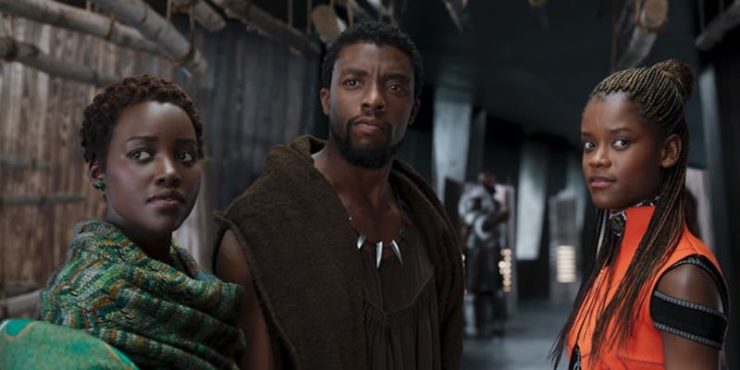Do you really need anyone to tell you that you should go see Black Panther? Do you?
You are reading these words, so maybe you do. So I’ll do my best here.
[This is a non-spoiler review of the film.]
Words kind of fail me, though, so I’ll start with similes and see where we end up…
Black Panther is like heading to a feast and finding that every food on the table is one of your favorite dishes, so you cry because you’re not sure how you’ll ever eat with that many possibilities and limited stomach space?
Black Panther is like reading a book and then being furious when it’s over because you can never read it for the first time again.
Black Panther is like realizing that you’ve spent your life rolling around in a dumpster because you just rolled around in gold leaf and puppies for the first time and it was awesome.
Black Panther is like the first time you ever watched Star Wars or Fellowship of the Ring; your brain starts behaving like it’s high because the whole experience feels like a dreamscape you’ve been desperately reaching for in your waking hours.
Black Panther is what I imagine a benevolent hurricane to be like, if those existed.
And this is pretty much just a fringe response because this movie isn’t even for me. Sure, I’m part of some checkbox demographic for being a geek who loves superheroes and all that. But when I left the theater, there was a crowd of black filmgoers taking pictures in front of the cardboard cutout of T’Challa, arms crossed over their chests like Wakandans, and it felt like my heart was going to explode. This movie belongs to them. That’s really all that matters.
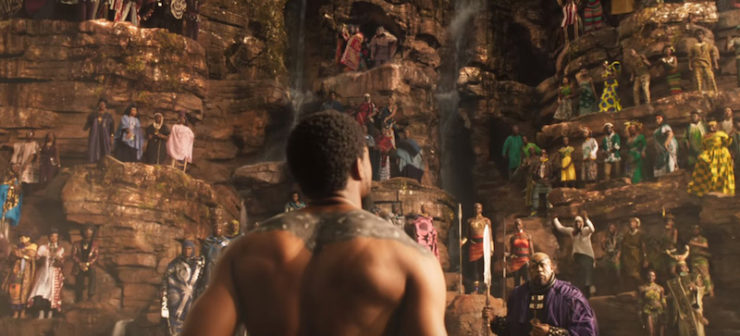
If you want a little more than that to shore you up until you’re in the theater, here’s what I’ve got. Both Ludwig Göransson’s score and Kendrick Lamar’s album for the film are transcendental. While Marvel films have floundered a bit in musical unity and power over the past decade, this is one soundtrack that will stand up in the years and decades to come. The costume work blows everything else out of the water in functionality, use of color, and imagination. The design work is unified and immaculate, which will offer a wonderful new layer to the MCU in movies to come.
The action sequences are all gems, tucked away and ready to burst. From the trailers they seemed kind of rote, flashy but nothing you haven’t seen before. The context of the fights make all the difference, and all the best reveals were helpfully withheld. If you like innovative action (especially action that isn’t over-reliant on guns), this movie is what your looking for. It seamlessly blends genres via the weaponry, choreography, and geography; some of the action has an Afropunk/Matrix vibe, some of it renders epic fantasy melded with Afrofuturism.
If I could make any critique whatsoever (aside from a super pedantic complaint that Wakadan letters match up with English ones whenever place name flashes on the screen), it would be that the plot itself is relatively predictable—but it’s barely a weakness, as the film occupies a space that is meant to play with superhero narratives and old epic structures. You could call it Shakespearean, you could call it mythic, but that’s not where the film lives. It’s not about the broad strokes, it’s about the details. It’s about all the little choices in concert, creating something brand new, and creating it on a scale that cinema has never seen before.
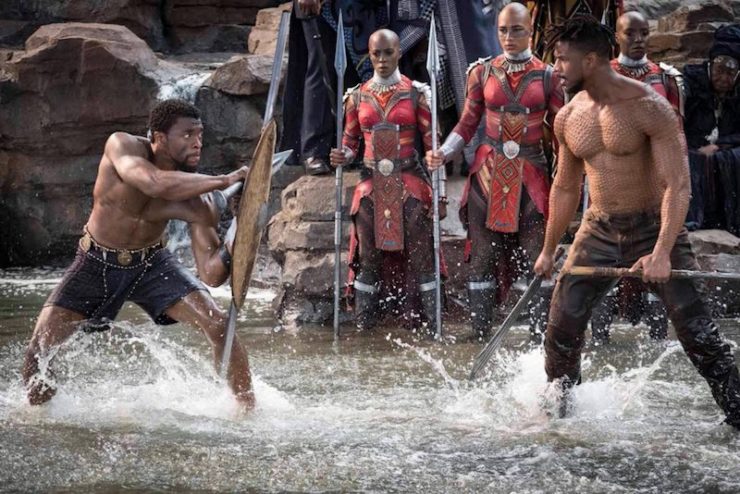
The cast is perfection. Chadwick Boseman radiates grace as T’Challa, even in his most conflicted moments. Michael B. Jordan’s Killmonger is the kind of villain that always works best in these films; not only one who has a personal beef to hash out with the hero, but one who is fighting for the right reasons via the wrong means. (Jordan himself has compared their dynamic to Professor X and Magneto, and it’s an extremely apt comparison to make.) Martin Freeman’s CIA operative Everett K. Ross, while largely ineffectual in his introduction in Captain America: Civil War, is ironically amusing as all get-out in this context, mostly just dragged about and constantly hushed.
The women in this film are phenomenal. Much deserved love for T’Challa aside, it is almost hard to care about him between the likes of his mother Ramonda (Angela Bassett), his sister Shuri (Letitia Wright), his general Okoye (Danai Gurira), and his ex-lover-turned-spy Nakia (Lupita Nyong’o) around. Every single one of these women is unique, every single one of them has incredible strength and brilliance. Black Panther has single-handedly knocked the entire MCU off its axis in its depiction of female characters. There are so many of them in one place for the very first time in any of these movies, and they are never sidelined by the story to make T’Challa more impressive—because the film understands that being surrounded by and listening to these women is what makes him impressive.
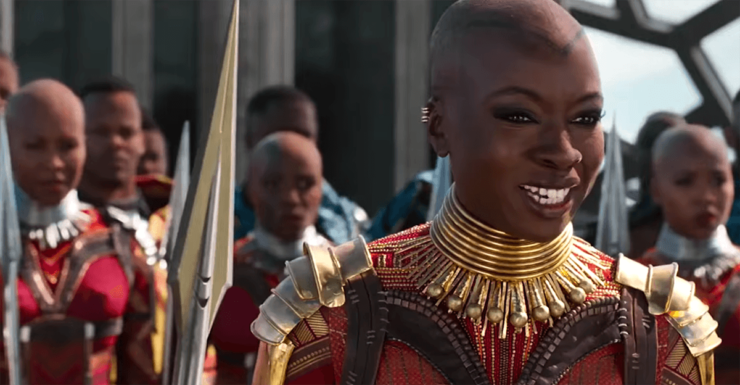
Seriously. Black Widow and Peggy Carter and Pepper Potts are all so important and wonderful, but I would willing go into battle and die if Okoye told me to. I would test every one of Shuri’s technological experiments, regardless of safety factors. I would wait on Queen Ramonda and I would travel the world undercover with Nakia. Any day, any time or place. And what’s better, these women are never objectified sexually or performatively, and none of them are put into gender normative boxes. They each have their own skills, their own clear perspectives, and they are all essential to the story.
Could have done with more Ramonda, though…
The film hits political notes that resonate deeply through the world right now, for all peoples and nations. Wakanda, as we know from Civil War, has hidden its advancements away from the world, keeping prying eyes at bay and warding off colonists who would raid their country for its resources. But such secrecy means that Wakanda has primarily looked after its own for millennia. With the world beginning to catch up to them, with people in need of help, and more threats cropping up every day, T’Challa and his people have a choice to make; do they continue to keep to themselves, or do they abandon those pretenses and help those who would greatly benefit from their wisdom and guidance?
It’s a refreshing tack to take, refusing to make the MCU so different from our own world that it ignores the effects of imperialism and disenfranchisement. The themes of the film sharply call out isolationist thinking, making the case for banding together and treating each other as a unified people, but it does so without sidelining the effects of colonization, mass incarceration, and poverty. It makes Wakanda and all of its riches—technologically and culturally—the inheritance of black people around the world.
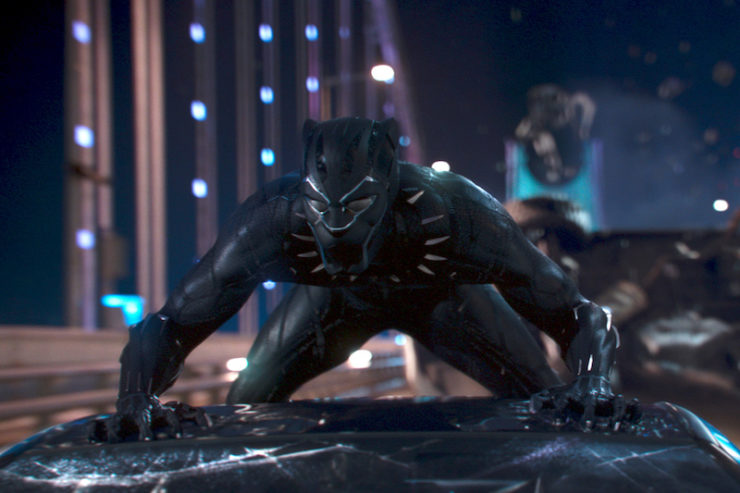
Do not cheat yourself out of this experience. Take your friends and your loved ones and soak in the vision that is Wakanda. Repeat the process as often as needed. It can only make the world brighter.
(And then come back next week for spoilery thoughts from Alex Brown!)
Emmet Asher-Perrin sobbed so hard through the last half hour of this film that she gave herself a migraine. You can bug her on Twitter and Tumblr, and read more of her work here and elsewhere.










